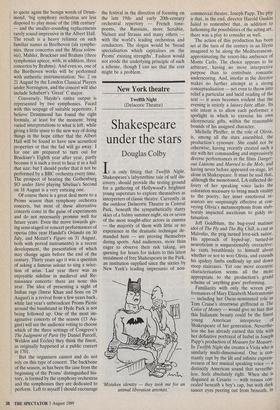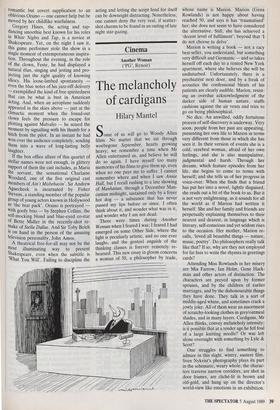New York theatre
Twelfth Night (Delacoric Theatre)
Shakespeare under the stars
Douglas Colby
It is only fitting that Twelfth Night, Shakespeare's labyrinthine tale of self dis- covery, should provide the testing ground for a gathering of Hollywood's brightest young superstars to explore themselves as interpreters of classic theatre. Currently, in the outdoor Delacoric Theatre in Central Park, beneath the sympathetically starry skies of a balmy summer night, six or seven of the most sought-after actors in cinema — the majority of them with little or no experience in the dramatic technique de- manded here — are proving themselves daring sports. And audiences, more than eager to observe their risk taking, are queuing for hours for tickets to this latest instalment of free Shakespeare in the Park, an institution supplied since the sixties by New York's leading impresario of non-
`Mistaken identity — they took me for an animal liberation arsonist.' commercial theatre, Joseph Papp. The pity is that, in the end, director Harold Luskin failed to remember that, in addition to fathoming the possibilities of the acting art, there was a play to consider as well.
The action of this production has been set at the turn of the century in an Illyria imagined to be along the Mediterranean, approximating the resort-like ambience of Monte Carlo. The choice appears to be arbitrary, having no more interpretive purpose than to contribute romantic underscoring. And, insofar as the director makes no further attempt at a strong conceptualisation — not even to throw into relief a particular and lucid reading of the text — it soon becomes evident that the evening is strictly a laissez faire affair- Its sole intent is to allow each performer a spotlight in which to exercise his own idiosyncratic gifts, within the reasonable bounds of his assigned character.
Michelle Pfeiffer, in the role of Olivia, is, among all the stars assembled, the production's cynosure. She could not be otherwise, having recently created such a stir with her commanding and impressively diverse performances in the films Danger- ous Liaisons and Married to the Mob, and having never before appeared on stage, let alone in Shakespeare. It must be said that, although the monotoned, LA-inflected de- livery of her speaking voice lacks the coloration necessary to bring much vitality to the poetry, her inner emotional re- sources are surprisingly effective at con- veying Olivia's metamorphosis from stub- bornly impacted asceticism to giddy in- fatuation.
Jeff Goldblum, the bug-eyed matinee idol of The Fly and The Big Chill, is cast as Malvolio, the prig turned love-sick suitor. His approach of hyped-up, turned-in neuroticism is unquestionably overactive: he rants breathlessly to himself about whether or not to woo Olivia, and extends his spidery limbs endlessly up and down steep staircases. Yet one more eccentric characterisation seems all the more appropriate to the production's grand scheme of 'anything goes' performing.
Familiarity with only the screen per- formances of Mary Elizabeth Mastrantonio — including her Oscar-nominated role as Tom Cruise's streetwise girlfriend in The Color of Money — would give no hint that this Italianate beauty could be the finest young American interpreter of Shakespeare of her generation. Neverthe- less she has already earned this title with her definitive portrayal of Isabel in Joseph Papp's production of Measure for Measure. In Twelfth Night she creates a Viola who is similarly multi-dimensional. One is con- stantly rapt by the lilt and infinite express- iveness of her musical speaking voice — a distinctly American sound that neverthe- less, feels absolutely right. When she is disguised as Cesario — with tresses con- cealed beneath a boy's cap, but with dark saucer eyes peering out from beneath, in
romantic but covert supplication to an oblivious Orsino — one cannot help but be moved by her childlike wistfulness.
Gregory Hines, the acting and tap- dancing smoothie best known for his roles in White Nights and Tap, is a novice at Shakespeare. Yet, on the night I saw it, this game performer stole the show in a single moment of extemporaneous inspira- tion. Throughout the evening, in the role of the clown, Feste, he had displayed a natural élan, singing and jesting and pro jetting just the right quality of knowing idiocy. His loose-limbed spontaneity even the blue notes of his jazz-riff delivery — exemplified the kind of free spiritedness that can be what is best in American acting. And, when an aeroplane suddenly appeared in the skies above — just at the Climactic moment when the found-out clown feels the pressure to escape for plotting against Malvalio — he seized the moment by signalling with his thumb for a hitch from the pilot. In an instant he had won ever the audience completely, sending them into a wave of long-lasting belly laughter.
If the box office allure of this quartet of stellar names were not enough, in glittery support of them the cast includes, as Maria the servant, the sensational Charlaine Woodard, one of the five original cast members of Ain't Misbehavin'. Sir Andrew Aguecheek is incarnated by Fisher Stevens, a standing member of the popular group of young actors known in Hollywood as 'the brat pack'. Orsino is portrayed with goofy brio — by Stephen Collins, the self-mocking blond and blue-eyed co-star of Bette Midler in the recently-shot re- make of Stella Dallas. And Sir Toby Belch is on hand in the person of the amusing television personality, John Amos.
A theatrical free-for-all may not be the Most illuminating way to present Shakespeare, even when the subtitle is `What You Will'. Failing to discipline the acting and letting the script fend for itself can be downright distracting. Nonetheless, one cannot deny the very real, if scatter- shot charms to be found in an outing of late night star-gazing.



















































 Previous page
Previous page